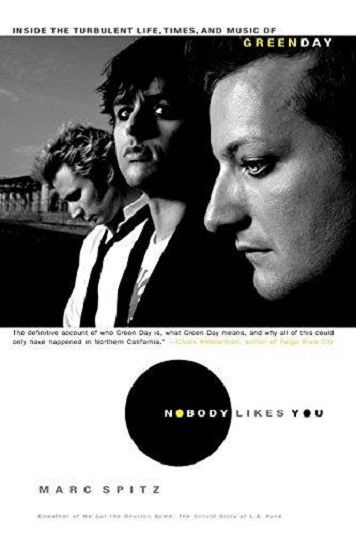Brooke Murphy reviews Nobody Likes You, a book about one of the biggest punk bands in the world — and one who stood apart.
I REMEMBER READING the book Nobody Likes You, by Marc Spitz, as a teenager on a weekend trip to Sydney with my parents. I think it was 2005, during the second-coming of pop-punk when, like so many teenagers, I was in the grip of an American Idiot obsession.
Except for Spitz’s attention to detail, I don’t remember much about the book itself. As an obsessed teenager, I wanted to know absolutely everything I could about Green Day and he gave me the all information I desired (and more).
Throughout the years, this book has remained at eye-level on my bookshelf. I’m still a massive Green Day fan, but that’s not the reason I’ve kept this book in my mind for so long. Why do I always keep this book within view in my apartment or office? Why is this book so important to me?
In short: the title. Nobody Likes You. I like to keep this book within view as a reminder that being an outsider is something that can make you and help you lift up others, even if it breaks you. The longer answer to this question is inextricably tied with the story of how Green Day rose to Rock and Roll Hall of Fame status.
Green Day: A Story of Alienation
Green Day experienced alienation from their "families" several times over. First, there was the exodus from their working-class families for a shot at something more adventurous. Later, was their more harrowing exile from the East Bay punk scene they had come to call home.
The members of Green Day have always been "outlaws". Their experience of being banished from 924 Gilman Street is always at the centre of any story about the band’s rise to fame. What is seldom recognised is how what was viewed as betrayals to "punk" ethos are also symptoms of being class straddlers.
All of the band members were underdogs from humble beginnings. Their story of exile proves how difficult it is to be a true working class hero and climb the social hierarchy while dragging others up with you. Every step of their success has been met with them being labelled as "sell-outs" who are not "real" punk rockers.
In my humble opinion, Green Day never really crossed that line. They were martyrs, but never scabs, even if their former East Bay family never saw it that way. Making punk appeal to the masses in the 1990s – and again in the 2000s – catapulted punk into the mindsets of new generations. Alongside songs about smoking weed and masturbation are songs about the Bush administration, war, unionism and social class.
Green Day’s newest album, Revolution Radio, came at a time when pop-punk had fallen in popularity. Old friends like Fall Out Boy, Blink 182 and Paramore had grown older, as had their fans. The album has received mostly positive – if mixed – reviews. Some reviewers found it to be even angrier than American Idiot, and some found it to be quite tame. Really, it was exactly what was intended: a call to arms — both politically and to reinvigorate punk culture.
The influence of punk has indeed dimmed over the years, but Green Day has always been there to fan the flame. From Dookie to American Idiot, and now Revolution Radio, Green Day have ignited inter-generational punk fires throughout their careers. Without Green Day’s influence, punk may have indeed remained dead.
So why do I keep this book at the front of my bookshelf?
Together, Green Day’s story and the title of the book always remind me that to do what is right and live by your values means sometimes you have to stand apart from others. To stand up or stand for something means that you might have a lot of shit thrown at you along the way. In many ways, it is easier to follow the crowd and do what makes your life simpler. However, what benefits you the most as a person seldom benefits the greater good.
What I admire most about Billie Joe, Mike and Tré is that they do what they believe is important without caring too much about what others think. In many instances, they have chosen the road less travelled not just to benefit themselves, but lift up as many others as possible. They have spread the message of punk to new generations, given back to the Oakland community, made "freaks and weirdos" like me feel like they belong, spoken out about political issues and played shows in a ways that makes every person in a stadium show feel special.
Essentially, this book reminds me that Green Day said “goodbye to the ones that [they] love” to not just better themselves, but the lives of so many others. Doing your best and living by admirable values is an uncomfortable experience, but it is indeed the most worthy cause you could ever know.
You can follow Brooke Murphy on Twitter @brooke___murphy. Entertainment editor John Turnbull is taking this week off.

This work is licensed under a Creative Commons Attribution-NonCommercial-NoDerivs 3.0 Australia License
Monthly Donation
Single Donation
Subscribe to IA, punk.











